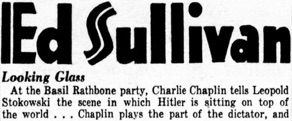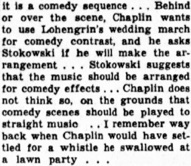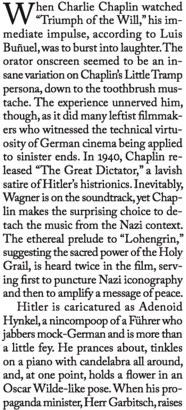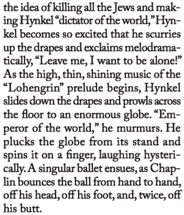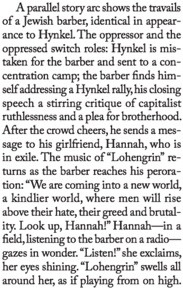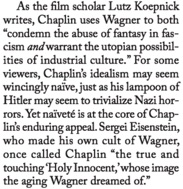The Great Dictator 1939 1941 next previous
The Great Dictator Clippings 65/369
Ed Sullivan, Citizen-News, Hollywood, L. A., Cal., Feb. 7, 1940.
When Charlie Chaplin watched „Triumph of the Will,“ his
immediate impulse, according to Luis Bunuel, was to burst
into laughter. The orator onscreen seemed to be an
insane variation on Chaplin‘s Little Tramp persona, down to the toothbrush mustache. The experience unnerved him,
though, as it did many leftist filmmakers who witnessed the
technical virtuosity of German cinema being applied
to sinister ends. In 1940, Chaplin released „The Great Dictator,“
a lavish satire of Hitler‘s histrionics. Inevitably, Wagner
is on the soundtrack, yet Chaplin makes the surprising choice
to detach the music from the Nazi context. The ethereal
prelude to „Lohengrin,“ suggesting the sacred power of the
Holy Grail, is heard twice in the film, serving first to
puncture Nazi iconography and then to amplify a message
of peace.
Hitler is caricatured as Adenoid Hynkel, a nincompoop
of a Führer who jabbers mock-German and is more
than a little fey. He prances about, tinkles on a piano with
candelabra all around, and, at one point, holds
a flower in an Oscar Wilde-like pose. When his propaganda
minister, Herr Garbitsch, raises the idea of killing all
the Jews and making Hynkel „dictator of the world,“ Hynkel
becomes so exited that he scurries up the drapes
and exclaims melodramatically, „Leave me, I want to be
alone!“ As the high, thin, shining music of the
„Lohengrin“ prelude begins, Hynkel slides down the drapes
and prowls across the floor to an enormous globe.
„Emperor of the world,“ he murmurs. He plucks the globe
from its stand and spins it on a finger, laughing
hysterically. A singular ballet ensues, as Chaplin bounces
the ball from hand to hand, off his head, off his
foot, and, twice, off his butt.
A parallel story arc shows the travails of a Jewish barber,
identical in appearance to Hynkel. The oppressor
and the oppressed switch roles: Hynkel is mistaken for the
barber and sent to a concentration camp: the barber
finds himself addressing a Hynkel rally, his closing speech
a stirring critique of capitalist ruthlessness and a plea
for brotherhood. After the crowd cheers, he sends a message
to his girlfriend, Hannah, who is in exile. The music of
„Lohengrin“ returns as the barber reaches his peroration:
„We are coming into a new world, a kindlier world,
where men will rise above their hate, their greed and
brutality. Look up, Hannah!“ Hannah – in a field,
listening to the barber on a radio – gazes in wonder. „Listen!“
she exclaims, her eyes shining. „Lohengrin“ swells all
around her, as if playing from on high.
As the film scholar Lutz Koepnick writes, Chaplin uses
Wagner to both „condemn the abuse of fantasy in
fascism and warrant the utopian possibilities of industrial
culture.“ For some viewers, Chaplin‘s idealism
may seem wincingly naive, just as his lampoon of Hitler
may seem to trivialize Nazi horrors. Yet naiveté
is at the core of Chaplin‘s enduring appeal. Sergei
Eisenstein, who made his own cult of Wagner,
once called Chaplin „the true and touching ,Holy Innocent,‘
whose image the aging Wagner dreamed of.
(...) WAGNER IN HOLLYWOOD
The composer left astonishing marks on the cinema.
BY ALEX ROSS, New Yorker, Aug. 31, 2020
„Comedy scenes should be played to straight music“
Editorial content. „Ed Sullivan
Looking Glass
At the Basil Rathbone party, Charlie Chaplin tells Leopold Stokowski the scene in which Hitler is sitting on top
of the world . . . Chaplin plays the part of the dictator, and
it is a comedy sequence . . . Behind or over the scene,
Chaplin wants to use Lohengrin‘s wedding march for comedy
contrast, and he asks Stokowski if he will make the
arrangement . . . Stokowski suggests that the music should
be arranged for comedy effects . . . Chaplin does
not think so, on the grounds that comedy scenes should
be played to straight music . . . I remember way
back when Chaplin would have settled for a whistle
he swallowed at a lawn party . . .“
Redaktioneller Inhalt
The Great Dictator 1939 1941 next previous

